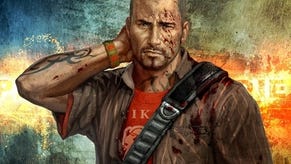MS support led to Homefront DLC deal
Plus: Kaos on story innovation and subtlety.
Developer Kaos Studios has told Eurogamer that the deal to bring all Homefront DLC to Xbox 360 first only came about because Microsoft showed great support for the game while Sony stood mute.
"It's really just about them coming to us and saying they want to get involved," senior level designer Rex Dickson explained during THQ's Gamer's Week in New York City last Friday.
Microsoft has made a habit in recent years of tying up time-limited exclusivity deals on downloadable content - famously including Grand Theft Auto IV, the Fallout titles and Call of Duty - and believes this has helped to drive Xbox Live subscriptions to their current 30 million user total.
"You know, the PlayStation version is great, but Sony really didn't come to us and say, 'We want to support you and get behind you.' I think their focus right now is on Killzone. So that's really how it all happened," Dickson added.
Kaos and THQ believe that gamers should be excited about Homefront for more reasons than just the DLC, of course. Last week's revelations were tied into the first hands-on with Homefront multiplayer, which you can read more about elsewhere on the site, and included the unveiling of Battle Commander - an AI system that tasks players with context-sensitive objectives during the course of battle.
"If you're not going to bring something new to the table then why even bother?" Dickson said of Battle Commander. "That was really the genesis of the idea. It's a way to service things that happen naturally in other games but build an actual feature around it."
Dickson's focus is primarily on single-player, where he told us that many of Homefront's best innovations are in storytelling - something that he believes has been neglected elsewhere in a swamped first-person shooter genre.
"I think you'd be hard-pressed to find anybody who would say there's a lot of innovation [in the FPS genre]," he told Eurogamer. "I think what you see in the FPS genre is just a lot of polish and production values. It's one of the most polished genres out there, where you almost have to be triple-A to even compete.
"I think Homefront in a way, its innovation comes at least on the single-player side not so much from the game mechanics perspective, but more about the fictional context, the dialogue, what the game is about - civilians in an occupied country.
"All those ideas are really unique. In the future I think we'd like to start pushing more innovation down to the mechanics level, but for us Homefront is a big step in that direction with the fictional side."
That future may mean additional Homefront games which deal with other elements of the Korean occupation of the continental United States - a situation far too deep-seated for the survivors to overcome in the course of a single adventure.
"We're telling just one story of this much larger world," said Dickson. "In our game the story is about a small group, a small insurgent cell making one small contribution that's feeding into a larger battle, and even that larger battle at the end of the game is just one small engagement that's happening in a big series of engagements that are happening all over the country."
And while Homefront has been criticised in some quarters for its choice of aggressors - particularly given escalating tensions between North and South Korea in recent months - Dickson, like THQ core games boss Danny Bilson, told Eurogamer that the studio was taking a subtle approach, heavily influenced by Half-Life 2 and nurtured by Hollywood screenwriter John Milius, who consulted on Homefront.
"There's a scene where a kids' parents get shot in front of the child and it starts crying," Dickson offered us by way of an example. "When we first introduced that idea, a lot of the developers weren't comfortable with it - they have families when they go home, they have kids - and were just like, 'Why are we putting this in the game? I don't like this.'
"But we're going for something where we're trying to make the player feel an emotion here, and it's sort of battling that urge to say, 'We can't go this far,' while others are like, 'We have to push this far if we want to push the medium forward.' That was an interesting battle in development, and I think any time you tackle unsettling themes like this, you're going to get people who just aren't comfortable with it.
"Look at Half-Life 2 - our model for pacing - and it takes a very subtle approach to the oppression. They don't bang you over the head with it. And that scene with the parents I was talking about - there's no gore in that scene, it's all audio and animation. You don't see brains splatter all over.
"We try to treat it subtly - and I think that's the key."
Homefront is due out for PC, PS3 and Xbox 360 in March.
For all the latest on Homefront, check out our dedicated microsite.




